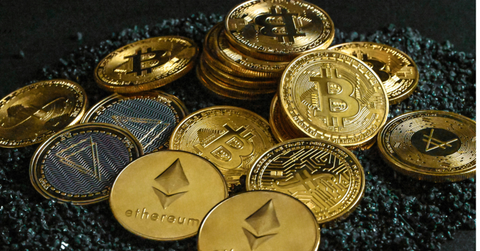Is 2025 THE Time to Get Into Crypto? Learn How to Pick a Cryptocurrency Exchange

Aug. 13 2025, Published 2:20 a.m. ET
Cryptocurrency, a facet of the revolutionary digital age we are lining in, has transformed from a niche experiment to a global financial movement. Despite still being relatively young, by now it is an essential financial tool for many, but with great opportunity comes great responsibility.
Why has choosing the right exchange become more critical than ever? What lessons should we learn from recent market events? Can you protect yourself from both market uncertainty and government overreach?
We did some research and found some fascinating insights about navigating the crypto exchange landscape in 2025.
The New 2025 Reality: No Better Time to Get Started in Crypto
Remember FTX? The exchange that seemed too big to fail until it did. Its 2022 collapse still haunts crypto markets in 2025, and for good reason: it was a complete breakdown of trust, governance, and basic financial practices.
When FTX imploded, millions of users discovered their funds weren't safely stored but were secretly used to cover trading losses and personal expenses. Customer deposits vanished overnight, audits turned out to be worthless, and what seemed like a rock-solid platform became a joke or a horror story, depending on who you ask. The lesson is crystal clear: not all exchanges are created equal, and a fancy interface or PR doesn't guarantee your money is safe.
The Rising Tide of Regulation and Digital Censorship
But that's not the only challenge facing crypto users today. Governments around the world are tightening their grip on cryptocurrency, implementing stricter rules that can freeze your assets or block your transactions at a moment's notice.
Countries are increasingly policing digital spaces, pushing harder AML/KYC requirements, emergency freeze powers, and cross-border controls that force exchanges to comply or shut down. This creates a new type of risk: your exchange might be perfectly secure from hackers but completely vulnerable to government pressure.
The old, simple way of choosing exchanges, just looking at fees and coin selection, isn't enough anymore. Today, you need to think about security, transparency, regulatory positioning, and much more. So let’s do it right here and now.
Fundamental Criteria for a Centralized Exchange (CEX) in 2025
When we talk about crypto exchanges, most people start with centralized exchanges (CEX) because they're user-friendly, familiar, and have the means to accept your regular money. But choosing the right CEX in 2025 requires understanding extra points that weren't as important only a few years ago.
Security First: Audits, Insurance, and Cold Storage
Metaphorically, not exactly technically, crypto exchange security is like a bank's security system. Hot wallets are your cash register for daily transactions and withdrawals, but they're facing the world and thus, are vulnerable to hacking. Cold wallets, on the other hand, are like the bank vault: heavily secured, not as easily accessible, especially for strangers, and used for long-term storage of the majority of funds.
The best exchanges keep 95% or more of customer funds in cold storage, publish regular Proof-of-Reserves reports to show they actually hold the cryptocurrencies they claim, and carry insurance policies that protect against theft or internal fraud. Look for exchanges that undergo independent security audits and have never been successfully hacked.
But security is also about compliance, love it or hate it. Strong KYC/AML procedures might seem annoying, but they actually protect the exchange from regulatory shutdown, which in turn, protects your continued access to funds on their balance.
Navigating the Fee Structure
Here's where many wannabe traders get surprised. The "0.1% trading fee" in the advertisement is just the tip of the iceberg. Real exchange costs include maker fees (when you provide liquidity), taker fees (when you take liquidity), withdrawal fees, deposit fees, and spread costs.
Let's say you're an active trader doing $10,000 trades 50 times a month. That's $500,000 in monthly volume. Even at a seemingly low 0.1% trading fee, you're paying $500 per month, or $6,000 per year just in trading fees! Add withdrawal fees every time you move coins to your wallet, which you ideally should do as often as possible, and the costs add up quickly.
Always calculate fees based on your actual trading patterns, not theoretical scenarios. Many exchanges offer volume discounts, so if you're trading large amounts, negotiate better rates.
Liquidity and Available Trading Pairs
Liquidity is the lifeblood of any exchange, crypto or not. High liquidity means you can buy or sell quickly at fair market prices. Low liquidity leads to slippage, where your order moves the market price against you, especially on larger trades.
Check the order book depth and 24-hour trading volumes for the cryptocurrency pairs you plan to use. An exchange might list hundreds of cryptocurrencies, but if there's no trading volume, you'll get poor prices and slow execution.
Also consider fiat on-ramps and off-ramps. Can you easily deposit your local currency? Are there convenient ways to cash out? Some exchanges excel at crypto-to-crypto trading but make it difficult to connect with traditional banking. A cryptocurrency exchange platform like ChangeHero is good for both, even if their actual use is situational compared to a CEX.
A CEX is still the most common starting point for the crypto journey for good reason, but success starts with understanding these core features. Security should always be your top priority, followed by honest evaluation of costs and trading capabilities.
Advanced Considerations for the Savvy Investor
The Regulatory Landscape and What to Look For
Understanding crypto regulation is no longer optional, it has become essential for protecting your investments. Major regulatory bodies like the U.S. SEC, Europe's MiCA framework, and other national regulators are actively shaping which exchanges can operate and how.
Some exchanges take a "regulation-first" approach: they proactively seek licenses, implement strict compliance, and work closely with authorities. This strategy offers stability and institutional trust, but it's a double-edged sword. These exchanges are less likely to suddenly shut down, sure, but they're more likely to freeze accounts, delist cryptocurrencies, or restrict features when regulators demand it.
Other exchanges prioritize user freedom and operate in crypto-friendly jurisdictions with minimal oversight. They offer more privacy and fewer restrictions, but they face higher risks of regulatory crackdowns or sudden closures.
This dilemma in reality is closer to a scale rather than a binary choice, which means that you are not exempt from the risks of one should you choose the other option. Instead of picking your poison, look at the big picture and prepare accordingly.
Custody Models
This is maybe the most important concept in cryptocurrency: whoever controls the private keys controls the funds. When you keep cryptocurrency on an exchange, you're trusting them to hold your keys safely. Convenient for trading, but it exposes you to exchange failures, hacks, and regulatory seizures.
As opposed to that, self-custody means owning your private keys, and while most crypto wallets are self-custodial, a few of them aren’t, so research is advised. Self-custody is the ultimate protection against exchange collapse and government interference.
Realistically, you are most likely to deal with a custodial exchange and a self-custody wallet. Splitting your holdings like that is a practical approach: keep active trading funds on trusted exchanges for convenience, but move your long-term savings to hardware wallets. This gives you the best of both worlds: trading flexibility and security for your core holdings.
User Interface and Ecosystem
Don't underestimate the importance of good design and customer support. Advanced trading features are great, but they're useless if the platform is confusing or if you can't get help when something goes wrong.
Look for exchanges with clean, intuitive interfaces, comprehensive educational resources, and responsive customer support. The best exchanges also provide detailed tutorials, fee calculators, risk explanations, and other tools that help you make informed decisions. The learning curve for cryptocurrency is already steep, don't make it harder by choosing a platform that's difficult to use.
CEX vs. DEX: The Great Debate of 2025
The choice between centralized exchanges (CEX) and decentralized exchanges (DEX) used to be a technical debate, but not anymore. Today, it's a fundamental decision about control, security, and convenience that every crypto user must understand.
The Case for Centralized Exchanges (CEX)
Centralized exchanges remain the most popular choice. They offer user-friendly interfaces that feel familiar to anyone who's used online banking or stock trading platforms. They provide deep liquidity and tight spreads, meaning you get fair prices and fast execution on your trades.
More importantly, CEX platforms also offer fiat on-ramps, making it easy to buy cryptocurrency with your credit card or bank account. When something goes wrong, you can contact customer support and get help. For margin trading, lending, and other advanced features, centralized exchanges typically offer more options and better user experiences.
The trade-off is obvious: convenience comes at the cost of control. You're trusting a third party with your funds, exposing yourself to all the risks we've discussed: exchange failure, regulatory pressure, and potential fund freezing.
The Case for Decentralized Exchanges (DEX)
Decentralized exchanges like Uniswap represent the original crypto vision: peer-to-peer trading without intermediaries. When you use a DEX, you maintain custody of your funds throughout the entire trading process. There's no central authority that can freeze your account or restrict your access.
DEX trading is also more private — most platforms don't require KYC verification, and transactions are pseudonymous on the blockchain. This makes DEXs censorship-resistant and ideal for users in countries with restrictive financial policies.
Obviously, DEXs come with their own challenges. The user experience is more complex, requiring familiarity with wallet connections, gas fees, and smart contract interactions. Trading costs can be higher due to network fees, and liquidity is often lower than major centralized exchanges. There's also smart contract risk: bugs in the code could lead to loss of funds, which are not as easily fixed as when there is an engineer on staff.
Making the Right Choice
Once again, the choice is not a strict binary but a spectrum. The truth is, most successful crypto users don't choose between CEX and DEX but use both strategically. A hybrid approach often works best:
Use centralized exchanges for initial fiat-to-crypto purchases, active trading, and accessing advanced features. Their user-friendly interfaces and deep liquidity make them ideal for these activities.
Use decentralized exchanges for privacy-sensitive transactions, accessing unique DeFi opportunities, and maintaining censorship resistance.
Always move long-term holdings to self-custody hardware wallets, regardless of whether you acquired them on a CEX or DEX.
If you value convenience and simplicity, lean toward reputable centralized exchanges. If you prioritize privacy and control, invest time in learning DEX protocols. Most users benefit from leveraging the strengths of both approaches.
Summary Checklist to Help You Choose
Here's your quick-reference guide for evaluating any crypto exchange:
✓ Security Check: Does the exchange publish recent Proof-of-Reserves reports and independent security audits?
✓ Fee Transparency: Is the complete fee structure clearly disclosed; is it competitive for your trading style?
✓ Regulatory Status: Does the exchange operate in a compliant jurisdiction with clear legal standing?
✓ Custody Options: What custody model do they use, and how easily can you withdraw to self-custody?
✓ Access Requirements: Are withdrawal limits, KYC requirements, and fiat on-ramps suitable for your needs?
✓ Trading Quality: Is liquidity sufficient for your trading pairs to minimize slippage and ensure fair pricing?
✓ Risk Management: Do they disclose insurance coverage, cold storage percentages, and bug bounty programs?
✓ Customer Support: Is support responsive with clear dispute resolution procedures?
✓ For DEXs: Are smart contract audits, governance mechanisms, and insurance protocols publicly available?
Keep this checklist handy whenever you're evaluating a new exchange or reviewing your current setup.

The Future is in Your Hands
2025 has changed a lot in crypto and the digital space, and this train is not stopping anytime soon. If you are having doubts about being late to crypto, this should really be the least of your concerns. Exploring alternative finance today can secure your autonomy and independence tomorrow. This is the real value of crypto, and you have not missed out on this at all just yet.
This article was prepared by Catherine Welsch. As the lead writer in the ChangeHero team, she educates the user base about all things blockchain and crypto.


